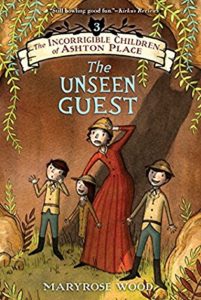
Book 3, The Incorrigible Children series
I first read The Mysterious Howling, book 1 of the series The Incorrigible Children of Ashton Place by Maryrose Wood, as an advance reader copy, some months before its publication date (in 2010). I was smitten and couldn’t wait to keep reading, but since the first book hadn’t even come out yet, the second was clearly far off in the misty future. And so my attention wavered, and by the time the second, and third, books appeared, I couldn’t recall the sense of urgency and let them go.
Until Now.
Last week I read book 2, The Hidden Gallery. I was then cautioned by a frustrated friend that book 6 had had its publication date delayed already multiple times throughout this year and was now scheduled for next year, so I thought, oh, I should take it slowly. And yet by the next day I was flying through book 3, The Unseen Guest. Which is where we are now. And because there were many many places where I felt compelled to stop and read excerpts out loud to those around me, I have decided to share some of them here as well. (I’m also taking this opportunity to go back and reread book 1.)
The general story is this: Young governess in Victorian England (she’s 15) is brought to a grand house to work with extremely untrained and fairly mysterious children. More mysteries ensue. My experience of the Incorrigible Children so far places the books as a hybrid cross between Joan Aiken’s Willoughby Chase novels (by temperament**) and Lemony Snicket’s Series of Unfortunate Events (by narrative style). The latter comparison, I hasten to clarify, is not so much due to unrelenting unfortunate events but instead to the narrator’s habit, rather like that of our heroic governess herself, of Teaching Us Things along the way.
Here are some examples, which should involve very few — and only minor — spoilers.
p. 64: ‘As Miss Lumley would later explain to the Incorrigibles, a rhetorical question is one that is asked, but that no one is expected to answer. “For what child does not like being treated kindly by an adult?” is a rhetorical question. So is “Why, it seems I’ve taken your saddle by mistake, Miss Pevington; how could I be such a dunce?” Not to mention the old standby, “Do bears live in the woods?”
‘There are countless such examples, but to catalog them all would take weeks, and who has time for that? (Note that “Who has time for that?” is also a rhetorical question. The curious among you may feel free to search for more instances within these pages, if you find that sort of treasure hunt enjoyable. And who doesn’t?)’
Then some plot happens.
p. 136: ‘But before we continue any further with the adventures of Miss Penelope Lumley and the three Incorrigible children as they venture into the forest in pursuit of a runaway ostrich, let us look away for a moment (for they will have to do quite a lot of hup, hup, hupping before they get far enough into the woods for things to become interesting) and consider some matters of linguistic significance, starting with three letters: namely, P, O, and E.
‘When the admiral first said POE, Miss Lumley thought he meant Poe, as in Edgar Allen Poe. This is because POE and Poe are homonyms, which means they are two different words that are pronounced the same way.
‘POE is also an acronym, which is a word made out of the first letters of other words. To the admiral it stood for Permanent Ostrich Enclosure, although POE could just as easily stand for something else: Pie Over Everything, for example, a tasty, if filling, notion. Or Ponder On Elks, which as you already know, is nearly impossible to avoid doing once you have been told (and told, and told yet again, in the strictest possible terms) not to ponder on elks.
‘Some acronyms prove so catchy that they become words in their own right. Marine explorers know that “scuba” is an acronym for Self-Contained Underwater Breathing Apparatus. Those of you who enjoy shooting laser beams at your friends for sport can bamboozle your opponents by crying out, “Here comes my Light Amplification by Stimulated Emission of Radiation!” just before you fire.
‘If you now think that you would rather confront a herd of Profoundly Outraged Elephants in a Perilously Oscillating Elevator than hear another word about homonyms, acronyms, or any other kind of nyms – well, think again. There is power in words used carelessly. Consider how disappointed you would feel if, after booking an expensive spa vacation, you found yourself on holiday with the Society of Professional Accountants instead.’***
Then most of the rest of the plot, but not all, intervenes before this next excerpt:
p. 278: ‘With no time to prepare a more complicated lesson, Penelope had left instructions for them to count how many pigeons landed in the branches of the elm tree outside the nursery window while she was out and to record the figures in what she unthinkingly called a PIE chart, by which she meant simply Pigeons In Elm. That the acronym for Pigeons In Elm was the same as that for Permanent Incorrigible Enclosure had not even occurred to the distracted governess, who had been in a tizzy deciding which dress to put on****, among other concerns. But the children knew nothing of the admiral’s plans and had simply understood their assignment to mean that the chart should be in the shape of a pie, complete with slices.
‘As it turned out, the pie-shaped chart worked wonderfully well. In fact, the “pie chart” remains in use to this very day, although the Incorrigible children themselves are rarely, if ever, given credit for its invention. (Why pie charts have stayed so popular while pudding charts, cupcake charts, and even tart charts have sunk into obscurity is a mathematical mystery, but perhaps it ought not to be, for who does not like pie?)’
Who, indeed?
—————————
*Not that I believe these lessons particularly need correction.
**Temperament of the humans and the story, not the temperament of the attendant wolves, which varies greatly between the series.
***Okay, I just keep feeling the need to add a note here saying that I see this panders to common stereotypes of accountants, which doesn’t seem strictly necessary. If someone is expecting a spa vacation, then they may be disappointed by any alternative, regardless of company, whether those number accountants or acrobats or aardvarks.
****I would like to mention that this is not a standard distraction for our stalwart Miss Penelope Lumley.

